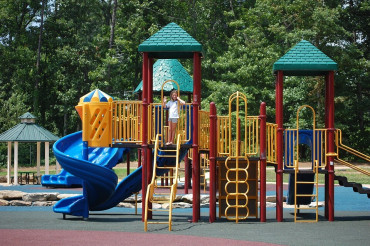The Truth About Concussions On The Playground

In a society that is becoming increasingly consumed by technology, our kids are missing out on the joys of simply using their imagination and enjoying nature. We commend you for getting your children away from the tablet or television screen and encouraging them to play outside. An afternoon at the park or in your backyard is the perfect way for your children to be active and have some fun with friends.
Unfortunately, the reality is that playground equipment comes with its risks as well. You sent your child outside to stimulate their brain, but this equipment also has the potential to injure that organ as well. Research has indicated that concussions from playground equipment are on the rise. Let’s look at some of the specifics.
What are the statistics surrounding playground concussions?
According to the Centers for Disease Control and Prevention, kids ages 14 and younger are increasingly suffering from concussions while on playground equipment. The study looked at children who visited emergency rooms throughout the country between 2001 and 2013. Of the 215,000 children who went to the ER each year for playground-related injuries, approximately 21,000 of these patients suffered from some form of traumatic brain injury (TBI), including concussion. This means that around 10% of those children each year were at the ER because they hurt their heads on playground equipment. The study also revealed that among children ages 5 through 9, boys were more likely to experience a brain injury. In fact, boys suffered from 58.6% of the documented TBIs.
What types of equipment pose the greatest risk?
Since is it estimated that 30,000 children may end up with concussions or other traumatic brain injuries this year because of playground equipment, it is important to know where the greatest risks exist. According to the study, swings and monkey bars are highest on the danger list. The question then becomes: are these pieces of playground equipment actually more dangerous, or are they just the most popular among children? Either way, it is essential to at least be aware of the potential for injury that is there.
How can I prevent my children from getting injured?
While you may want to keep your children in a protective bubble or have them walk around constantly wearing helmets, kids still have the desire and right to play. In fact, in some cases, helmets may actually be more harmful than helpful anyways, as buckles and straps can get tangled or caught in the playground equipment.
Unfortunately, there is no fool-proof way to keep your children safe on the playground at all times. Accidents happen. However, you can be there to supervise and guide them. Choose to visit playgrounds that offer age-appropriate equipment. Do not even tempt your little ones by going to a playground that only has “big kid” activities. Additionally, steer your children to areas that you know they can handle. If your 5-year-old is still working on his strength, maybe the monkey bars at a busy park is not the best idea. You should also keep your older children away from the areas that are intended for toddlers, so that the little ones have plenty of room to play without worrying about getting in the way of or knocked over by the older children.
While there is no way to eliminate all risks on the playground, increased awareness and supervision can help to keep your kids safe.
Disclaimer: Ross Feller Casey, LLP provides legal advice only after an attorney-client relationship is formed. Our website is an introduction to the firm and does not create a relationship between our attorneys and clients. An attorney-client relationship is formed only after a written agreement is signed by the client and the firm. Because every case is unique, the description of awards and summary of cases successfully handled are not intended to imply or guarantee that same success in other cases. Ross Feller Casey, LLP represents catastrophically injured persons and their families in injury and wrongful death cases, providing legal representation in Pennsylvania and New Jersey.





